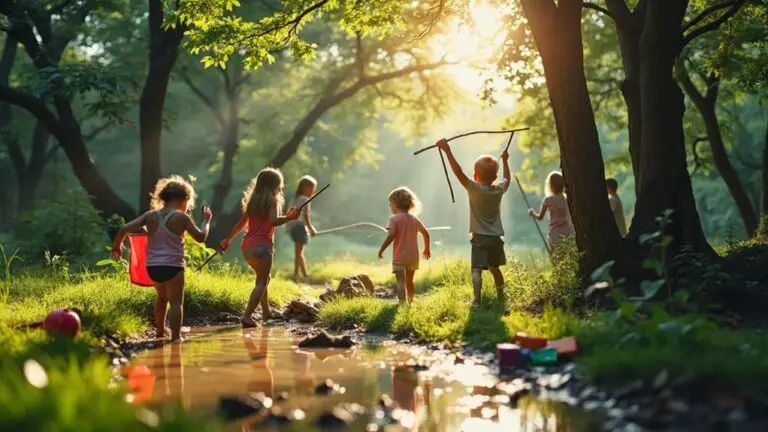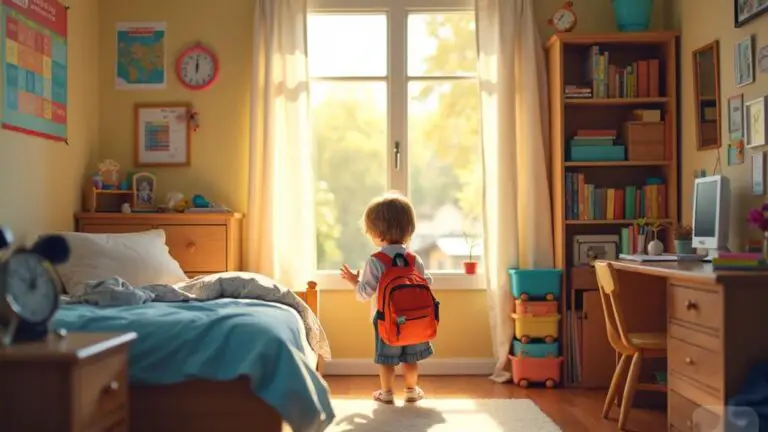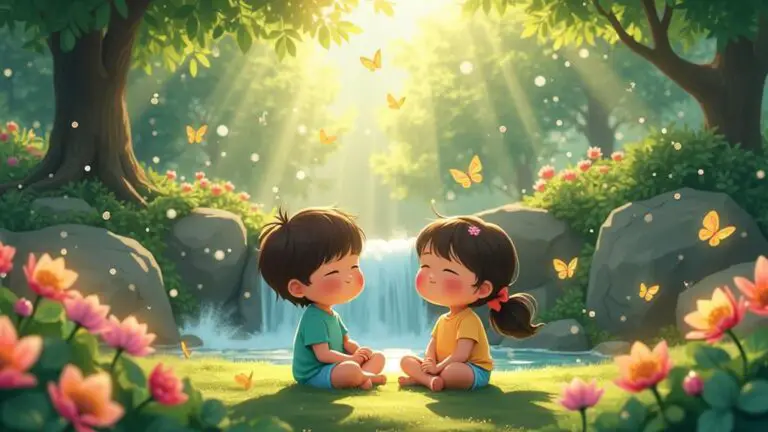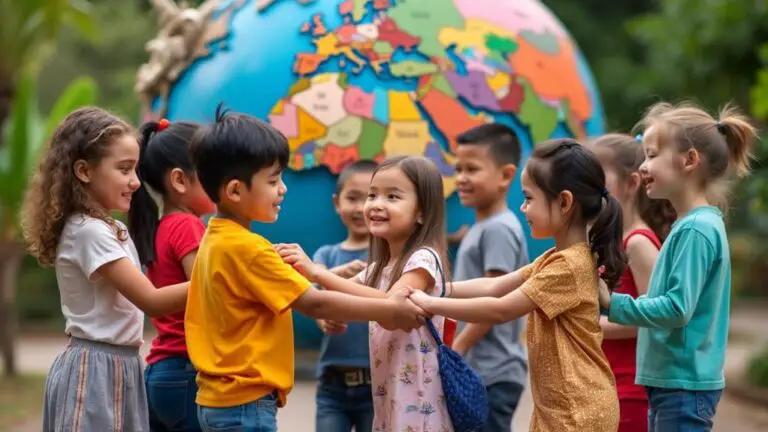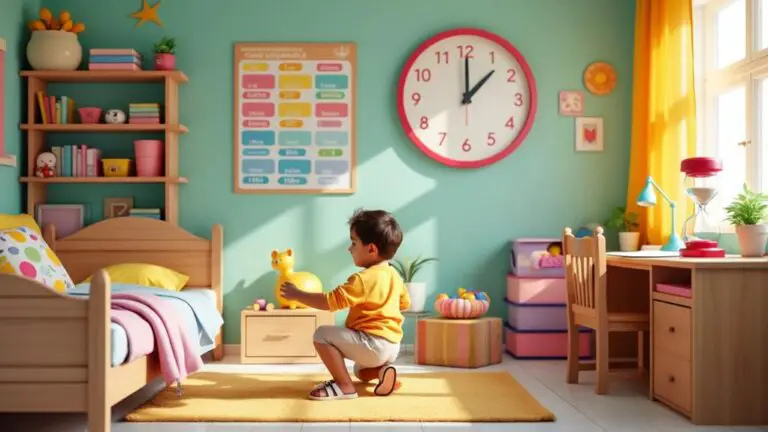Promoting Environmental Awareness in Kids
I've always believed that nurturing environmental awareness in children is essential for our planet's future. As someone who's worked with kids, I've seen firsthand how their innate curiosity can be channeled into a genuine passion for nature and conservation. But it's not just about teaching facts; it's about inspiring action. There's a delicate balance between informing kids about environmental challenges and empowering them to make a difference. In my experience, the most effective approaches combine hands-on activities with thoughtful discussions. But what specific strategies can parents and educators use to cultivate this awareness without overwhelming young minds?
Key Takeaways
- Model sustainable behaviors to shape children's attitudes towards the environment.
- Encourage outdoor activities and nature-based play to enhance environmental awareness.
- Engage in hands-on activities like gardening and recycling crafts to deepen understanding of environmental issues.
- Use positive communication to explain environmental concepts and praise eco-friendly efforts.
- Create a sustainable home environment with energy-efficient appliances and waste reduction practices.
Teach by Example
Actions speak louder than words when it comes to teaching kids about environmental awareness. As a parent, I've found that modeling sustainable behaviors is essential in shaping my children's attitudes towards protecting the environment. I make a conscious effort to demonstrate eco-friendly habits like recycling, conserving water, and reducing waste.
By using reusable bags and containers, I'm not only minimizing our household's environmental impact but also instilling a sense of responsibility in my kids.
I've created a home environment that prioritizes sustainability, incorporating energy-efficient appliances and a composting system. This approach makes eco-friendly practices a natural part of our daily lives.
I engage my children in discussions about the positive impacts of their actions, explaining how turning off lights or using the recycling bin contributes to environmental conservation. By consistently praising their efforts, I'm fostering lifelong habits that will benefit our planet.
Connect With Nature
While modeling eco-friendly behaviors at home is important, I've found that connecting children with nature amplifies their environmental awareness. I encourage outdoor activities like hiking and nature walks to foster a bond with nature, which contributes to their physical and emotional growth.
Gardening projects are another great way to teach kids about food sources and responsibility. They love watching plants grow and caring for them firsthand.
I've noticed that nature-based play enhances curiosity and appreciation for the environment. Organizing nature walks to observe local wildlife helps children develop observational skills and understand biodiversity.
These outdoor experiences not only support physical health but also nurture environmental stewardship. By connecting with nature, children develop a sense of responsibility for the natural world, which is essential for fostering long-term environmental awareness and action.
Engage in Hands-On Activities
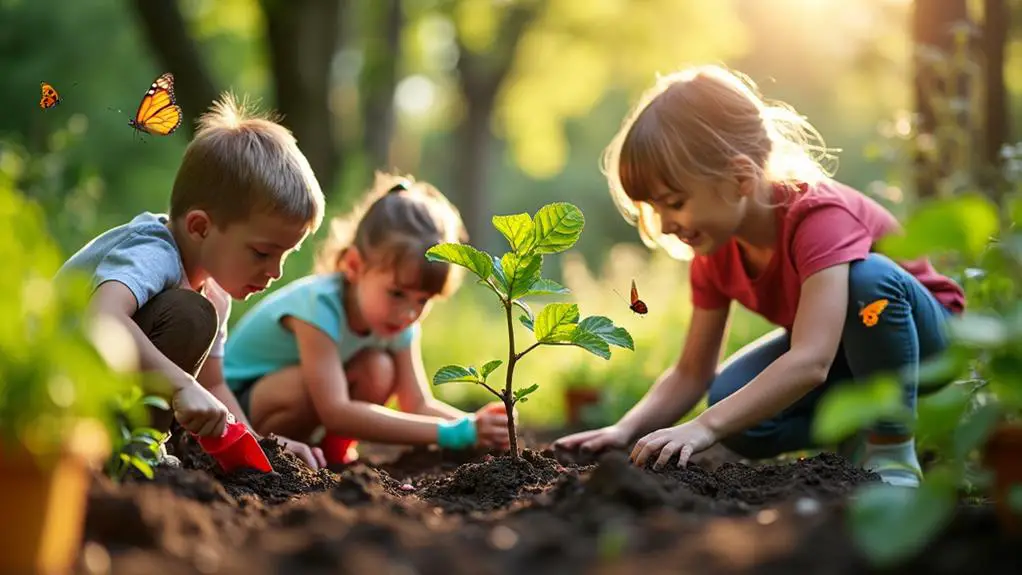
Hands-on activities are essential for deepening children's understanding of environmental issues. I've found that engaging in activities like gardening projects provides kids with hands-on experience in plant growth and biodiversity.
Composting sessions are another great way to teach them about turning food waste into nutrient-rich soil. I love introducing recycling crafts, which not only spark creativity but also show the importance of reusing materials.
To tackle environmental issues, I conduct simple experiments that demonstrate pollution's effects on plants. It's fascinating to see how these activities encourage critical thinking.
I've also had success with interactive lessons on renewable resources, like building solar ovens. These hands-on experiences with sustainable energy solutions empower children to explore practical applications.
Foster Positive Communication
Beyond hands-on activities, fostering positive communication about environmental issues is key to nurturing eco-conscious kids. When educating children about the importance of protecting our planet, I use simple, relatable examples to help them understand complex topics without feeling overwhelmed. I focus on positive actions like recycling and conserving water, which promote optimism and encourage eco-friendly behaviors.
I've found that nurturing environmental awareness is most effective when I encourage curiosity about nature. By allowing kids to ask questions and explore their surroundings, I create opportunities for learning and foster a sense of wonder.
I always praise their eco-friendly efforts, as positive reinforcement motivates them to continue making sustainable choices. By avoiding alarmist language and emphasizing constructive approaches, I've noticed that children remain optimistic and proactive about sustainability, rather than feeling anxious about environmental challenges.
Conclusion
I've learned that promoting environmental awareness in kids is essential for our planet's future. By setting a good example, helping children connect with nature, engaging them in hands-on activities, and fostering positive communication, I'm empowering the next generation to become Earth's guardians. It's not just about teaching; it's about inspiring action. Together, we're nurturing eco-conscious minds that'll shape a sustainable world. Every small step counts, and I'm excited to see the impact these young environmentalists will make.


